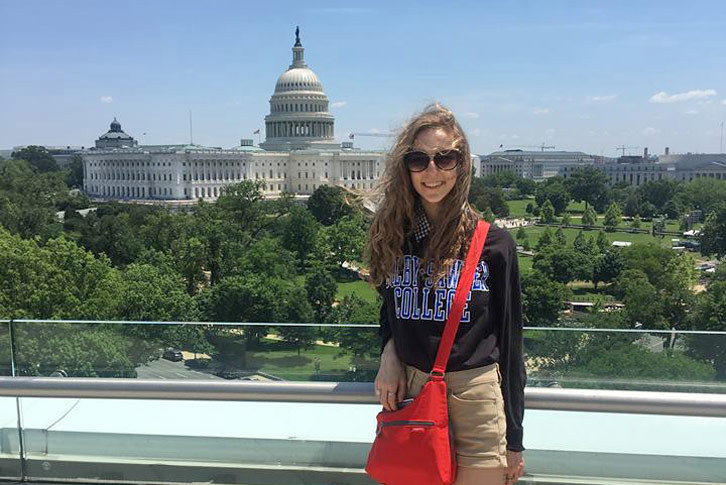Ayla Cordell ’19, a sociology major from West Chesterfield, N.H., interned in D.C. this summer with New Hampshire’s U.S. Maggie Hassan. As a legislative intern, Cordell attended legislative hearings and briefings, conducted tours of the Capitol and served as an interface between the senator and her constituents.
Cordell has been invested in politics since high school—she’s spent previous summers phone-banking for candidates and volunteering in her district—and her internship nurtured her social consciousness, the same drive that drove her to major in sociology.
Cordell was one of several students this summer to receive a generous grant from the Presidential Initiative to offset the cost of living in the nation’s capitol. A Dean’s List student and Resident Assistant, Cordell is an active member of the campus community.
While many Colby-Sawyer students have interned on Capitol Hill, few have been sociology majors. Why did you pick this internship, and how do you see it connected to sociology?
I’ve always admired Senator Hassan, as the second woman in United States history to be elected to serve as both governor and U.S. Senator. The opportunity to work in her office was immediately appealing: I would gain insight into the legislative process and work with the senator from my home state.
With the many facets of sociology, the possible fields for an internship are abundant. After taking courses that examine race, gender, sexuality, religion, class, culture and the many other dimensions of human identity, I better appreciated how laws and policy can wholly shape life course, accessibility, opportunity—why not explore in an internship deeply invested in politics?
How have your courses helped prepare you for your internship?
I attended a briefing that discussed alternatives to family detention, and a woman who had been held in detention with her daughter for nearly a year shared her story, providing a micro, human approach to family detention. Other panelists—who spoke about policy, law, and recommendations to congress—then contextualized her story. My knowledge of micro and macro approaches, and my ability to understand the multifaceted narratives that comprise these human experiences and the systems that shape them, allowed me to write a nuanced memo of the briefing that encompassed all its dimensions in a succinct, readable way.
The deputy chief of legislative staff approached me and told me I had done great work and that they used my memo for one of the senator’s speaking opportunities. This was an incredibly gratifying moment for me, as I saw my work directly extend all the way up to the senator. It felt like a culmination of the work I had been completing all summer.

National politics were incredibly busy this summer. What did it feel like to be apart of this political moment in America? What stands out in your memory?
I was presented with so many opportunities this summer on the hill to see things I had never seen before. If you told me I would be sitting in the courtroom of the Supreme Court, seeing Ruth Bader Ginsberg—a legend in her own right—speak, I would not have believed you. I never thought I might know my way through the underground maze of tunnels connecting buildings, or that I might effectively navigate the mosaic-filled hallways of the Capitol building, giving tours and on my way to the Senate floor to watch our senator speak on essential issues of our time.
I will not forget walking into the Main Reading Room of the Library of Congress, a sanctuary for timeworn pages and broken bindings, lined on seemingly ceaseless shelves beyond my highest reach. So much of my summer in D.C. felt this way, and these are the moments I most remember. It was almost surreal to walk through halls of opulence while seeing so closely how the nation is suffering, to see the representatives of our nation I only knew through soundbites and news articles debating and shaping policies and lives, to watch protests and insistent activism in a center of change. I was witness to it all.
In what ways did your internship impact your career plans? Do you still want to pursue the political-side of sociology?
The opportunity to explore the dynamics of working on the Hill has given me invaluable insight into my future career plans. Though I am unsure if I will work directly in politics again, I see myself working in places of change and activism. This internship experience brought a desire for continued adventure—of places I haven’t yet been, brimming with historical and cultural enrichment, and of boundless independent growth matched by efforts for change and progress at every level.